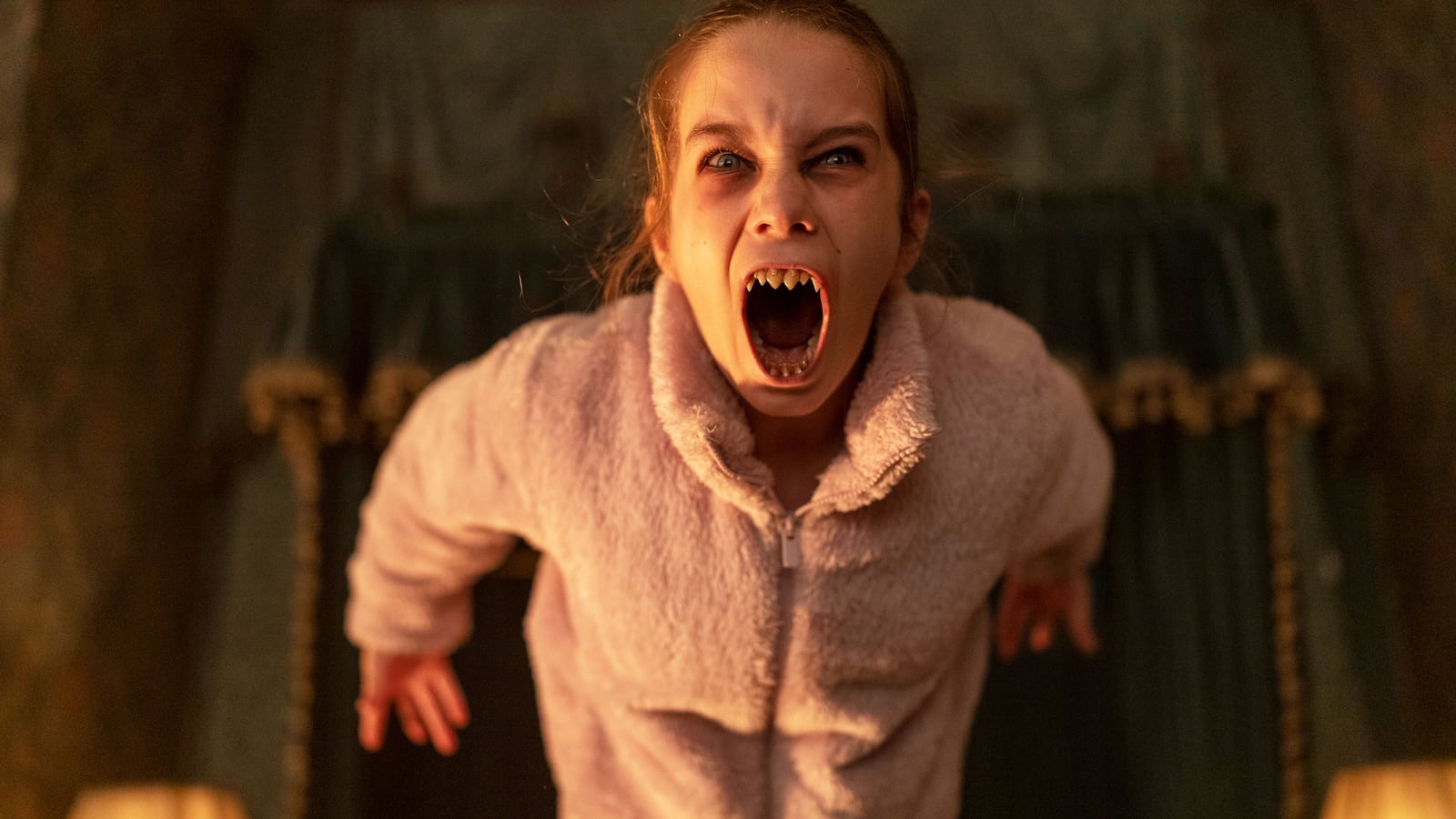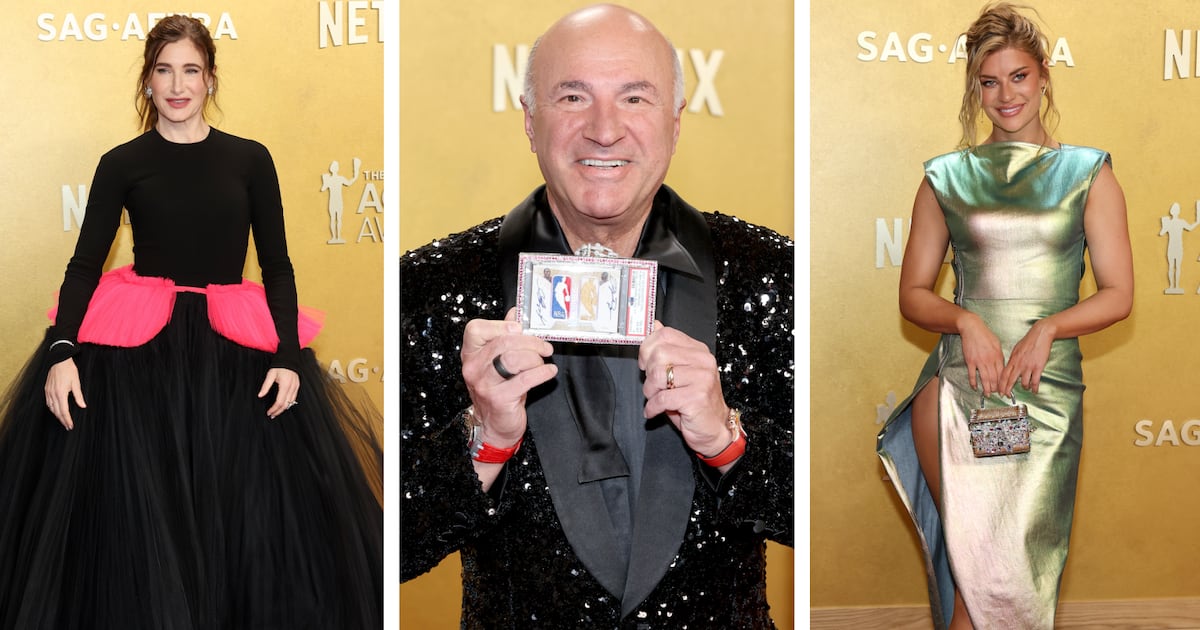Kids do the darndest things, and in Abigail, that includes sprouting fangs and sucking blood while wearing cute tutus. That plot point would, under normal circumstances, be classified as a spoiler, considering that Matt Bettinelli-Olpin and Tyler Gillett’s film, which hits theaters Apr. 19, hides its central surprise for its first third. Unfortunately, with the marketing department having totally let the cat out of the proverbial bag in order to get teenagers into multiplex seats, there’s zero mystery to this gruesome horrorshow—which is almost as deleterious as the material’s fondness for exposition over frights, bloat over concision, and clichés over invention.
As with their prior Scream and Scream VI, Bettinelli-Olpin and Gillett’s latest has modest personality but scant creative terror. Very loosely based on 1936’s Dracula's Daughter (by which I mean, it shares that predecessor’s basic conceit and virtually nothing else), this clumsy bloodbath concerns a seemingly perfect crime that goes horribly wrong. In an unnamed city, adolescent ballerina Abigail (Alisha Weir) travels home from rehearsal in a Rolls Royce to her opulent manor house. Unbeknownst to her, she’s not alone, since a gang of crooks are lurking in her bedroom’s shadows. Led by no-nonsense Frank (Dan Stevens), this gang has been hired by Lambert (Giancarlo Esposito) to kidnap Abigail, transport her to a different lavish residence, and hold her hostage for 24 hours, at the end of which they’ll earn a collective $50 million.
Snatching and grabbing Abigail is a cinch for this squad, whose members use a syringe and duffel bag to knock the girl out and haul her to their destination. Upon completing this initial portion of their mission, Lambert welcomes them by stating, “My lovely pack of rats!” and then gives them monikers based on the Rat Pack: junkie medic Joey (Melissa Barrera); tattooed tech whiz Sammy (Kathryn Newton); dim-witted muscle Peter (Kevin Durand); slacker wheelman Dean (Angus Cloud); cool-headed sniper Rickles (William Catlett); and unfriendly Frank. Once Abigail is locked up, the sextet plays a prolonged guessing game regarding their real identities and origins, during which Joey—who’s already proven herself to be the compassionate foil to untrustworthy Frank—cornily lays out everyone’s backstory. More troubling than this ham-fisted info dump, however, is the fact that none of these individuals are unique or funny, chief among them Joey, who’s so obviously positioned as the nominal hero that her every subsequent goody-two-shoes gesture grates.

Alisha Weir and Kathryn Newton
Universal StudiosStephen Shields and Guy Busick’s script fails to make its protagonists compelling but at least it quickly gets down to business. Even so, the film’s speediness can’t mask the obliviousness of its characters, who somehow don’t recognize that the house in which they’ve holed up is a musty, cobwebby haunted mansion (complete with suits of armor) that looks like it’s been transported from Disney World. In the massive library, Joey messes with the malfunctioning shutters on a giant window (foreshadowing!) and ignores the giant statue of a creepy robed man and his young daughter. Similarly, Dean is more interested in drinking booze, smoking weed, and pulling childish pranks on Sammy than the mural of a batty Transylvania castle and a creepy young girl who looks an awful lot like Abigail.
Abigail takes its sweet time killing off its first victim, at which point the crew—who’ve deduced that their captive is the daughter of a famed underworld kingpin—begins to fear that they’re being hunted by a mob hitman and, moreover, that one of them might secretly be the assassin. Given the neon-red clues about the true nature of their predicament, however, this comes across as just filler, and it’s a mercy when it’s set aside for unholy mayhem. Unwilling to pretend any longer around her captors, Abigail reveals herself to be a centuries-old vampire in a pre-teen girl’s body, and as she bares her fangs, growls and shrieks, and leaps and pirouettes about while stalking her prey, the film temporarily comes to rip-roaring life, unshackled by the groan-worthy dialogue and character development of its stodgy early going.

Melissa Barrera and Dan Stevens
Universal StudiosDecked out in a frilly tutu that nicely clashes with her mouthful of razor-sharp teeth, Abigail is a captivating fiend, and her love of toying with her targets lends the action a bit of devious liveliness. Yet directors Bettinelli-Olpin and Gillett do little with a lot. Despite an elaborate confined setting, a collection of disparate types, and an attention-grabbing villain,Abigail generates no suspense or humor. To make up for those deficits, plentiful gore is sprayed around, albeit to snoozy effect; there’s nothing scary or funny about the decapitations, impalements, and maulings that eventually take center stage. Worse still, Abigail’s ruses are of a pedestrian sort, further rendering this affair a generic supernatural riff on Agatha Christie’s And Then There Were None—a novel that cheekily factors into the finale.
Stevens chews scenery with such sleazy gusto that he comes close to overshadowing the one-note nature of his kidnapper, who from the start is telegraphed as the film’s de facto baddie. Save for a mildly amusing lunkheaded turn by Durand, the rest of the cast don’t stand out, and at the head of that pack is Barrera, whose performance as a drug addict with a tortured past and a heart of gold makes her ho-hum headlining work in Bettinelli-Olpin and Gillett’s Scream sequels look charismatic by comparison.
Nonetheless, the real issue here is simply a dearth of novelty—an insurmountable shortcoming for a B-movie that should be able to drum up some thrills from its offspring-of-Nosferatu premise. That it doesn’t is depressing, if perhaps not as frustrating as a conclusion that piles on one fake ending after another until it begins to seem as if everyone involved is actively searching for a way to wrap things up.
After what feels like a third-act eternity, Abigail settles on a lengthy action sequence that reconfigures prior allegiances and rivalries. Yet by mostly doing away with horror at this late stage, Bettinelli-Olpin and Gillett betray the wannabe-ghoulish spirit of their undertaking, just as a last dose of cloying sentimentality proves a fatal stake through the heart.






